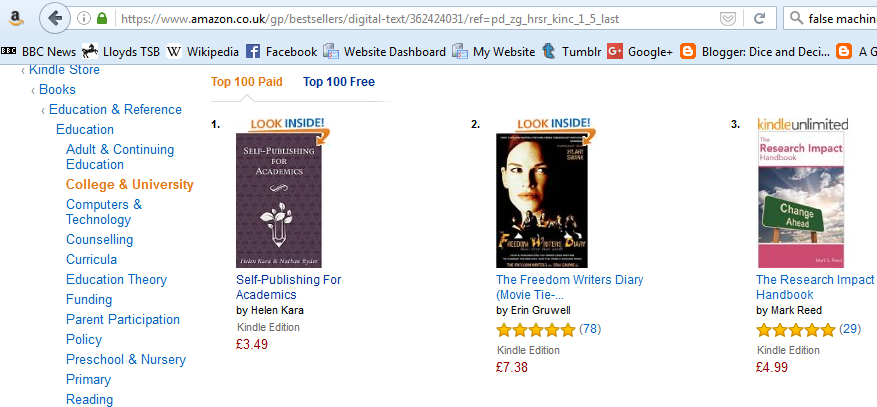If I had to sum up my post-PhD life, I would simply say:
“I am very fortunate.”
Thirteen years ago today I started a journey. I started a business that has been supported by friends, family and mentors, advised by colleagues and peers, inspired by random questions and chance encounters, encouraged and directed by feedback.
My work is not what it started out as. What I do has evolved a lot. It doesn’t feel like thirteen years.
(in a weird way it feels like forever)
Last week I had a chat with a PhD candidate who is thinking about becoming someone who independently supports researchers. There are lots of possible titles for this kind of work. Alternative academic. Freelance skills trainer. Academic coach. Independent researcher-developer.
There are lots of ways to say someone who helps.
We talked about what I do, how I do it, how I’ve done it and some of what I’ve learned. Afterwards I realised that there were things I’d missed out. There’s a lot I’ve learned over the last thirteen years. Some I learned from other people telling me. Some I learned from reading books or blog posts. Some I learned through hard experience.
This post isn’t advice. This isn’t the old hand telling the new person what to do. These are just thirteen thoughts for thirteen years. Over time these thoughts or beliefs have certainly helped me.
I hope that some of them might help someone else.
In the following points I use the word “you” a lot. I’m not telling “you” what to do. Really, I’m reminding myself…
1. Being clear helps. When you’re clear about what you do, you help yourself and others. When you’re clear in your speech and writing you communicate more effectively. When you’re clear in presenting you free up time for more interesting questions.
2. Saying no is necessary. You have to say no to possible clients. You have to say no so you have space to do work. You have to say no so you can figure out what you will say yes to. You have to say no when it is easy and when it is hard. If you don’t say no then you lead yourself to being overwhelmed.
3. You don’t need a full plan to start work. Waiting to have all the information, outputs and outcomes can mean you never start. It can mean ideas stagnate and enthusiasm wains. Make notes, plan if it’s important – but get started before you stop yourself completely.
4. You don’t need all the answers to be able to help someone. Perfectionism is a trap. You’ll never know enough to help everyone, but you can always help someone. If you know something that someone else doesn’t then you can help them.
5. Finding a practice amplifies ability. For example, you can be a good writer. Writing regularly helps. Publishing regularly helps. Having a consistent practice that requires you to complete something regularly will force habits to build, force skills, processes and routines to develop. It will help talent grow.
6. You need allies. Friends, co-workers, colleagues, peers, mentors, people who write newsletters, people you know from Twitter. You might know them personally or you might not. They could provide inspiration, share good practice, share ideas you agree with, provide insights you rebel against. And remember that if they help you, then you can probably help them.
7. Record your numbers. How many people do you help? How many blog posts do you write? How many seminars do you do? How many times per year do you show up? Recording statistics is one way of showing others (and yourself) that you are serious, that you are committed and that you do the work.
8. Thank everyone. If someone helps, say thank you. If someone asks you to help them, say thank you. Thank your audience. Thank someone who gives you feedback. Thank someone who offers a great opportunity, whether or not you say yes. By extension, find reasons to be thankful, regularly.
9. Exposure doesn’t pay the bills… Say no to requests that undervalue your experience, your knowledge and the work that you do.
10. …but “free” work can still help. Maybe say yes to working for free if it is on your terms and you can find a way to use it to improve yourself or your situation. Decide in advance under what conditions you would be willing to work for free. Decide what aspects of your work you would be willing to offer for free. By extension, decide on what you will not do for free.
11. You don’t get paid to do admin. You still have to do it. Email, filling in forms, sorting your bank accounts, creating files, setting up Zoom meetings… Figure out how you can streamline all of this as much as possible: templates, flow diagrams, copy and paste etc. Then price yourself accordingly. Someone might pay you for, say, a three-hour webinar, but you have to make sure that fee covers your setup and prep time, time spent writing emails and everything else.
12. Love what you do. This is different from “do what you love”. (you can have both)
13. Find a vision. Goals come and go. Circumstances change. The unthinkable becomes the everyday. Having a vision can keep you going throughout. Your vision is why you do what you do, both motivation and meaning. It helps you decide quickly between opportunities and keeps you honest. Find a vision and follow it.
I am very fortunate. I have had so much help. I still have a lot of support.
If I’ve worked with you – in any sense – in the last thirteen years, thank you.
Extra special thanks to Kay and CJ, my wife and daughter, who keep me going, who keep me inspired and who keep me smiling.



